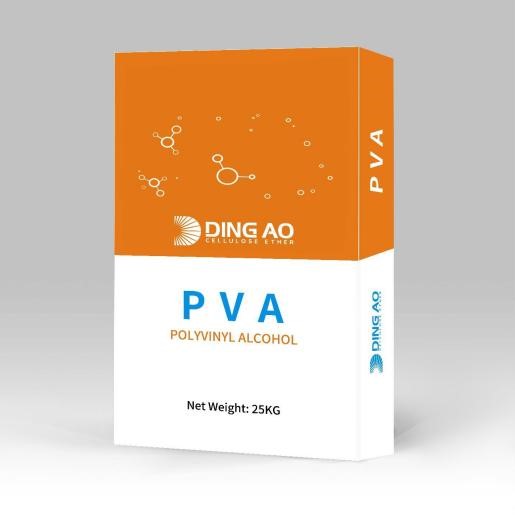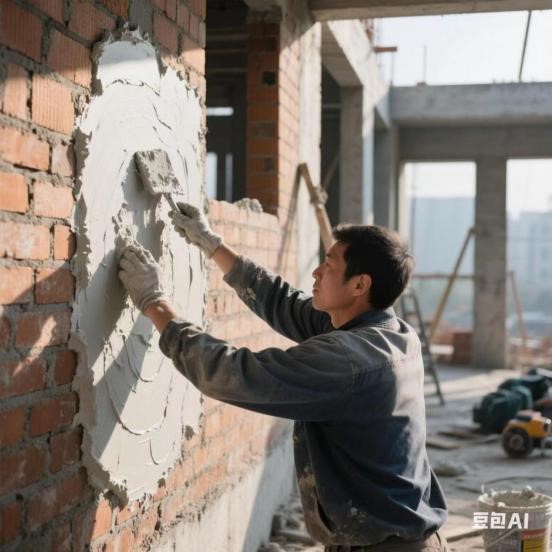PVA
 P
VA, namely polyvinyl alcohol, is a water-soluble polymer. It typically appears as white powder, flakes, or flocculent solids. Chemically, it is produced by the alcoholysis of polyvinyl acetate. The numerous hydroxyl groups in its molecules endow it with excellent hydrophilicity and water solubility. Its characteristics are remarkable: the aqueous solution has high viscosity and film-forming property, and the formed film is flexible with high transparency; it has strong chemical stability, resistant to weak acids and alkalis; in addition, it also has good adhesiveness, emulsifying property, and antistatic property, which are widely used in textile, papermaking, construction, medicine, and other fields as adhesives, emulsifiers, coating materials, etc.
P
VA, namely polyvinyl alcohol, is a water-soluble polymer. It typically appears as white powder, flakes, or flocculent solids. Chemically, it is produced by the alcoholysis of polyvinyl acetate. The numerous hydroxyl groups in its molecules endow it with excellent hydrophilicity and water solubility. Its characteristics are remarkable: the aqueous solution has high viscosity and film-forming property, and the formed film is flexible with high transparency; it has strong chemical stability, resistant to weak acids and alkalis; in addition, it also has good adhesiveness, emulsifying property, and antistatic property, which are widely used in textile, papermaking, construction, medicine, and other fields as adhesives, emulsifiers, coating materials, etc.Technical Dada
| ltem | Polyvinyl alcohol(PVA2488) |
| Hydrolysis(%): | ≥99.0 |
| Viscosity(mPa.s ): | 78.0-87.0 |
| Volatil(%): | ≤7.0 |
| Punty(%): | ≥91.5 |
| Ash | ≤1.0 |
Effet
High adhesion mortar, high adhesion paint,warp sizing, paper processing, film, acetal derivatives, etc
Packing
25kg, paper-plastic composite bags or kraft paper valve bags. Other types of packages,
such as big bags, can be supplied if required.
Storage
1. Closed at room temperature, away from light, ventilated and dry place
2. Store in a cool and ventilated warehouse. Keep away from fire and heat. Should be stored separately from oxidizer, do not mix storage.
3. Equipped with the corresponding variety and quantity of fire equipment. Storage areas should be equipped with suitable materials to contain leaks.
Product safety
This product is approved by REACH. For detailed safety issue, please refer to MSDS.
Polyvinyl Alcohol(PVA206)
Polyvinyl alcohol (PVA206) is a water-soluble environmentally friendly polymer, non-toxic and pollution-free, with good magic forming properties, emulsifying properties, bonding properties and spinning properties. The film formed by it has excellent adhesion, solvent resistance, friction resistance, tensile strength and oxygen resistance.
Technical Dada
| ltem | Polyvinyl alcohol(PVA206) |
| Hydrolysis(%): | 86.0-90.0 |
| Viscosity(mPa.s ): | 26.0-33.0 |
| Volatil(%): | ≤7.0 |
| Punty(%): | ≥91.5 |
| PH | 5-7 |
PVA206(17-88) polymer powder is particularly suitable for the use of building mortar, with methyl cellulose ether water retaining agent, can improve your flexibility, water retention, improve mortar viscosity. It can also reduce the friction of the mortar, thereby enhancing the efficiency and quality of the work.
Packing
25kg, paper-plastic composite bags or kraft paper valve bags. Other types of packages,
such as big bags, can be supplied if required.
Storage
1. Closed at room temperature, away from light, ventilated and dry place
3. Store in a cool and ventilated warehouse. Keep away from fire and heat. Should be stored separately from oxidizer, do not mix storage.
3. Equipped with the corresponding variety and quantity of fire equipment. Storage areas should be equipped with suitable materials to contain leaks.
Product safety
This product is approved by REACH. For detailed safety issue, please refer to MSDS.
Polyvinyl Alcohol(PVA218)
Polyvinyl alcohol PVA218 is a white solid, the shape is divided into granular, powder, flake, non-toxic, tasteless, pollution-free, and its aqueous solution has good adhesion and film formation. Resistant to most organic solvents such as oils, lubricants and hydrocarbons.
Technical Dada
| ltem | Polyvinyl alcohol(PVA218) |
| Hydrolysis(%): | ≥99.0 |
| Viscosity(mPa.s ): | 22.0-32.0 |
| Volatil(%): | ≤7.0 |
| Punty(%): | ≥91.5 |
| Degree of Polymerization | Actual measurement |
| Ash | ≤1.0 |
Effet
Mainly used in coating adhesive, building adhesive, film, vinyl acetate emulsion polymerization stabilizer, PVA rubber and other aspects.
Packing
25kg, paper-plastic composite bags or kraft paper valve bags. Other types of packages,
such as big bags, can be supplied if required. Storage
1. Closed at room temperature, away from light, ventilated and dry place
4. Store in a cool and ventilated warehouse. Keep away from fire and heat. Should be stored separately from oxidizer, do not mix storage.
3. Equipped with the corresponding variety and quantity of fire equipment. Storage areas should be equipped with suitable materials to contain leaks. Product safety
This product is approved by REACH. For detailed safety issue, please refer to MSDS.
Polyvinyl Alcohol(PVA103)
Polyvinyl alcohol(PVA103)cold water soluble polyvinyl alcohol powder is a white polymer powder that can be dissolved in cold water. It has good film forming property, adhesion, solvent resistance, friction resistance and tensile strength.
| ltem | Polyvinyl alcohol(PVA103) |
| Hydrolysis(%): | 86.0-90.0 |
| Viscosity(mPa.s ): | 46.0-56.0 |
| Volatil(%): | ≤7.0 |
| Punty(%): | ≥91.5 |
| PH | 5-7 |
| Boreadth depth | ≥160 |
Widely used in cement, gypsum and lime based interior wall dry powder putty or mortar products.
Packing
25kg, paper-plastic composite bags or kraft paper valve bags. Other types of packages,
such as big bags, can be supplied if required.
Storage
1. Closed at room temperature, away from light, ventilated and dry place
5. Store in a cool and ventilated warehouse. Keep away from fire and heat. Should be stored separately from oxidizer, do not mix storage.
3. Equipped with the corresponding variety and quantity of fire equipment. Storage areas should be equipped with suitable materials to contain leaks.
Product safety
This product is approved by REACH. For detailed safety issue, please refer to MSDS.
 PVA is widely used in the construction industry. With its excellent adhesiveness, film-forming property and water resistance, it can serve as the core component of adhesives such as tile glue and wallpaper glue to enhance the bonding firmness between materials. It is used in wall coatings and waterproof coatings to improve the scrub resistance, weather resistance and waterproof performance of the coating. Added to putty and mortar, it can improve construction performance and enhance water retention and crack resistance. It can also be made into water-soluble films for chemical packaging or used as a moisture-proof isolation layer in wet areas. In addition, adding a small amount to concrete can improve its workability and crack resistance, helping to enhance the quality and durability of construction projects.
PVA is widely used in the construction industry. With its excellent adhesiveness, film-forming property and water resistance, it can serve as the core component of adhesives such as tile glue and wallpaper glue to enhance the bonding firmness between materials. It is used in wall coatings and waterproof coatings to improve the scrub resistance, weather resistance and waterproof performance of the coating. Added to putty and mortar, it can improve construction performance and enhance water retention and crack resistance. It can also be made into water-soluble films for chemical packaging or used as a moisture-proof isolation layer in wet areas. In addition, adding a small amount to concrete can improve its workability and crack resistance, helping to enhance the quality and durability of construction projects. PVA plays a key role in the textile industry. With good film-forming and adhesive properties, it serves as an important sizing agent for warp yarns, effectively improving yarn wear resistance and strength to reduce breakage during weaving. As a fabric finishing agent, it can improve the hand feel, luster and wrinkle resistance of fabrics. In the printing and dyeing process, PVA can be used as a printing paste to ensure clear patterns and improve color paste stability. Besides, it is also applied to prepare functional textile materials, endowing fabrics with special properties to enhance product quality and added value.
PVA plays a key role in the textile industry. With good film-forming and adhesive properties, it serves as an important sizing agent for warp yarns, effectively improving yarn wear resistance and strength to reduce breakage during weaving. As a fabric finishing agent, it can improve the hand feel, luster and wrinkle resistance of fabrics. In the printing and dyeing process, PVA can be used as a printing paste to ensure clear patterns and improve color paste stability. Besides, it is also applied to prepare functional textile materials, endowing fabrics with special properties to enhance product quality and added value.Get A Quote Today
Please leave your contact details and requirements and we will contact you as soon as possible.
